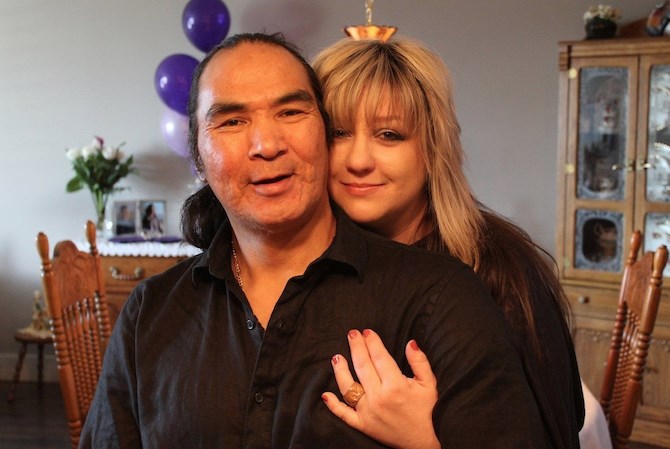
Sanford and Marlana Williams at their place, on Vancouver Island.
Image Credit: SUBMITTED
March 17, 2021 - 9:00 PM
Master carver Sanford Williams is well known among art circles across Canada. His carvings adorn the walls of notable institutions world over.
He not only comes from a lineage of renowned carvers, but his people – the Mowachaht First Nation from Yuquot (Friendly Cove) on the west coast of Vancouver Island – have a rich 4,000-year-old history. Yuquot is where Captain James Cook’s arrived in 1778 and ‘first contact’ is recorded between Europeans and Vancouver Island First Nations.
But that legacy is brought crumbling down every time Sanford faces discrimination – which has been a steady reality throughout his life.
And every instance has made him relive the trauma of his time at residential school, the sexual and physical abuse he endured there and the centuries of mistreatment that his people have witnessed through colonization.
Since he was a young man, employees at retail outlets have followed him around in stores to make sure that he’s not “stealing” or intoxicated.
When he is out his wife Marlana – who is not First Nations – servers and clerks either ignore or hassle him, and question his ability to make a purchase until Marlana drifts to his side.
Sanford is now 54, but he has never retaliated nor spoken out against the discrimination. This is a trait he says he shares with many other residential school survivors in Canada who either “shrug it off” or “learned to deal with it.”
“I didn’t know how to speak up,” he said, adding that he always ended up feeling like a “really bad person.”
It’s a feeling that constantly follows him around mostly in cities. On the west coast of Vancouver Island, he is most comfortable with his family and friends – First Nations or not – without being judged.
“But when I leave that environment, I can feel the change right away.”
Sanford silently burns inside with hurt and anger at the way society treats Indigenous people. He only began venting about it, when he met Marlana, who over the years helped him articulate and speak out these feelings.
“He won’t say anything but in his mind he’s thinking, ‘I am not a drunk, I’m a world-class artist, why are you treating me like I’m beneath you when you don’t even know the person I am?” she said.
Marlana said that as a “white woman married to an Indigenous man”, although she is not the one experiencing racism she feels the ripple effect of it, especially when her husband is mistreated.
On social media, ignorant people take every excuse to perpetrate racism against First Nations, she said.
”They try to find a way to explain their racism without saying that they’re racist.”
In a recent altercation on social media, Marlana recieved flak for defending Sanford and his family in a conversation about the poor quality of drinking water in First Nation communities. She said commentators refused to acknowledge the racism in their statements instead calling her a “liberal” and adding “everything triggers you.”
Both Sanford and Marlana want people to research and go back to history before they propagate stereotypes and misconceptions. But sometimes asking the crowd to research and look at the full picture also backfires.
"They see it as an insult as nobody likes to be told that the don’t have all the information," said the couple.
Those who make discriminatory remarks are ignorant about the cruelty of the past and the ongoing issues that First Nations communities continue to face.
“The problem is that too many people are touting free speech, or using that as an excuse to say hurtful things,” said Sanford.
Those who racially profile natives as drunkards, don’t realize that many Indigenous people historically resorted to alcoholism to cope with the trauma inflicted on them in residential schools, he said.
There’s a need for more constructive dialogues between Indigenous and non-Indigenous people, said Marlana and added that people entering these dialogues must exercise caution.
“There are a lot of First Nations people that were abused in residential school and they don’t have the communication skills. They have got it all in their mind and they want to let it out but don’t know how.”
If the other side joins this conversation with fixed opinions and without the intention to listen and understand, it’s meaningless, she said.
— This story was originally published by the Campbell River Mirror.
News from © iNFOnews, 2021